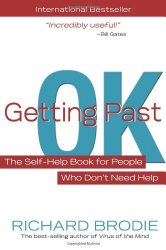Sun Aug 30 09:32:28 PDT 2015
Getting Past Ok: A Straightforward Guide to Having a Fantastic Life by Richard Brodie
 |
This is a really good self-help book! Richard Brodie makes much of the fact that he went to Harvard (which he mentions on every other page) and the fact that he worked at Microsoft (this mentioned in one only one page in ten). However, the wisdom conveyed in the pages is impressive - and certainly worth the ten dollar price tag. This is a book that I recommend - if you are interested in improving the quality of your life. Some of the key elements are:
- Understand where you are, trust yourself and accept yourself
- Get your 'undones' done:
- Create a list of 'undones'
- Create a list of 'excuses'
- Create a list of 'displacement activities'
- Work through the 'undones'
- Discover what qualities you relate to and appreciate
- Focus your life around these
- Based on you and what you value - tune your future
What is appealing about the book is the suspicion that it conveys that here is an author who had the chance to do what many would like to do: take time to evaluate his life, experiment with various regimes and strategies, select the best and then communicate that information to others. The reader imagines that Brodie had the opportunity to do this because he made some money from his time at Microsoft (I hope that was the case).
Here is some additional information. In order to establish your life purpose, consider the following questions:
- What do you want?
- What have been your greatest successes?
- What do you admire in others?
- What do you enjoy which is not mainstream?
- What values are most important to you?
- What did you really enjoy doing as a kid?
- What is your ideal job?
- What is your ideal relationship?
- What is life about from the point of view of your favorite pet or object?
When you have thought about your most important needs, create a Success Checklist which links needs, means and structures. For example, an engineer might have the following needs: (independence, control, recognition) linked to the means of (making money) in the structure of a (software engineering job) the same individual might have additional needs: (discovery, challenge, accomplishment) linked to the means of (solving technical problems) also in the structure of a (software engineering job).
These are interesting ideas which augment the GTD fascination with clearing the decks and charging through the lists, with attention to the why's and wherefore's.